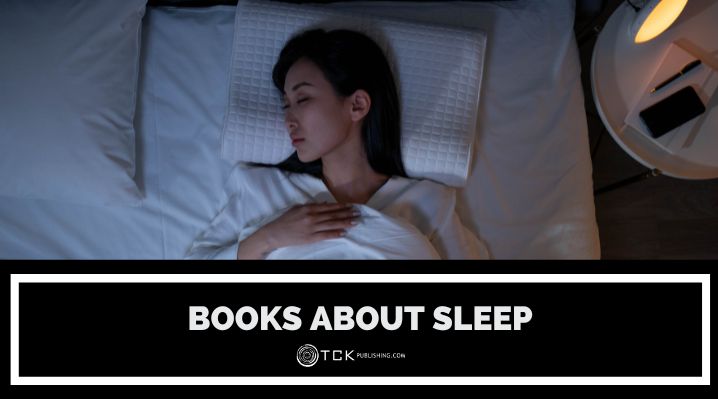
Sleep is an essential part of your life, yet you sometimes find it elusive. From falling asleep to waking up dissatisfied, many sleep-related issues can negatively impact your overall well-being.
At their worst, these issues become chronic illnesses and sleep disorders. Fortunately, there are plenty of ways to improve your sleep quality.
Books about Sleep
Numerous nonfiction books dive into the study of sleep. Whether you’re looking to improve yours or understand the science of it, these books can provide valuable information.
1. Why We Sleep by Matthew Walker
Poor sleep can lead to chronic conditions like Alzheimer’s, obesity, and heart disease. Dr. Matthew Walker’s research shows that sleep helps with emotional regulation, appetite control, memory, and immune function. He also provides practical steps to improve and maintain good sleep quality.
2. The Sleep Revolution by Arianna Huffington
People are ignoring the harmful effects of sleep deprivation. Arianna Huffington urges a cultural change, advocating for sleep as a priority. She talks about how technology affects sleep, the benefits of napping, and the importance of a bedtime routine. Using science and personal stories, she gives tips on how to make the most of sleep.
3. The Sleep Solution by W. Chris Winter
W. Chris Winter, a neurologist and sleep specialist, offers a comprehensive guide to understanding and improving sleep. He gives you a rundown of the science behind it, its common issues, and practical advice to help you achieve better rest.
4. The Nocturnal Brain by Guy Leschziner
From sleepwalking to night terrors, Dr. Guy Leschziner has encountered and remedied plenty of sleep disorders. Through these case studies and using accessible language, he explains the possible biological and psychological causes of these conditions, as well as their treatment.
5. Sleep Smarter by Shawn Stevenson
People tend to forget that sleep is also a necessary element of good health. Shawn Stevenson learned that the hard way after a life-changing disease. Through quality sleep and nutrition, he was not only able to heal but also achieve more than he thought possible for his body.
Here, Stevenson shares easy tips and tricks for getting better sleep. You’ll learn how to create a sleep-friendly environment, reduce stress, regulate your body clock, and optimize your nutrition.
6. The Circadian Code by Satchin Panda
People have daily routines that can sometimes be disrupted. However, for some, this disruption is constant, leading to feeling tired or hungry at odd hours and difficulty sleeping at night.
Dr. Satchin Panda discusses the importance of your circadian clock, explaining how it works and how to recognize when it’s disturbed. He also suggests lifestyle changes to improve sleep and prevent chronic ailments and other conditions.
7. Why We Dream by Alice Robb
Alice Robb examines the science and significance of dreaming—how dreams aren’t random but a glimpse into your subconscious. They play a role in your creativity, the sharpness of your memory, and how you process emotions. She also discusses the possible benefits of dreaming to your physical and emotional health.
8. Say Goodnight to Insomnia by Gregg D. Jacobs
Insomnia is one of the more common sleep disorders that people experience. Jacobs talks about the dangers of sleeping pills, common misconceptions about sleep, and his natural, drug-free approach to curing insomnia.
Developed and tested at Harvard Medical School, Jacobs’ program has an 80% success rate in improving sleep. He provides techniques for establishing good sleep practices, relaxation exercises, and eliminating sleeping pills.
9. Sleep by Nick Littlehales
Sleep has a direct effect on your mood, cognitive functions, creativity, stress, and motivation. When you are unable to sleep, you rely on stimulants that further leave you drained.
Nick Littlehales is a sleep coach to some of the world’s biggest athletes. Forget about the 8-hour rule. Here, he shares his proven and flexible strategies for sleeping and performing better.
10. Dreamland by David K. Randall
Journalist David K. Randall never gave much thought about sleep—until he injures himself during a sleepwalking session. It has since led him deep into the science behind sleep. Here, he discusses how our understanding of sleep has evolved, along with the impacts of modern technology on our sleep patterns.
What are your favorite books about sleep? Share them in the comments below!
If you enjoyed this post, then you might also like:
- Bedtime Stories for Adults to Help You Get a Good Night’s Sleep
- Can You Read in Dreams? A Literary Sleep Analysis
- How to Sleep Better at Night: 11 Simple Changes for Deeper, More Restful Sleep

Cole is a blog writer and aspiring novelist. He has a degree in Communications and is an advocate of media and information literacy and responsible media practices. Aside from his interest in technology, crafts, and food, he’s also your typical science fiction and fantasy junkie, spending most of his free time reading through an ever-growing to-be-read list. It’s either that or procrastinating over actually writing his book. Wish him luck!
